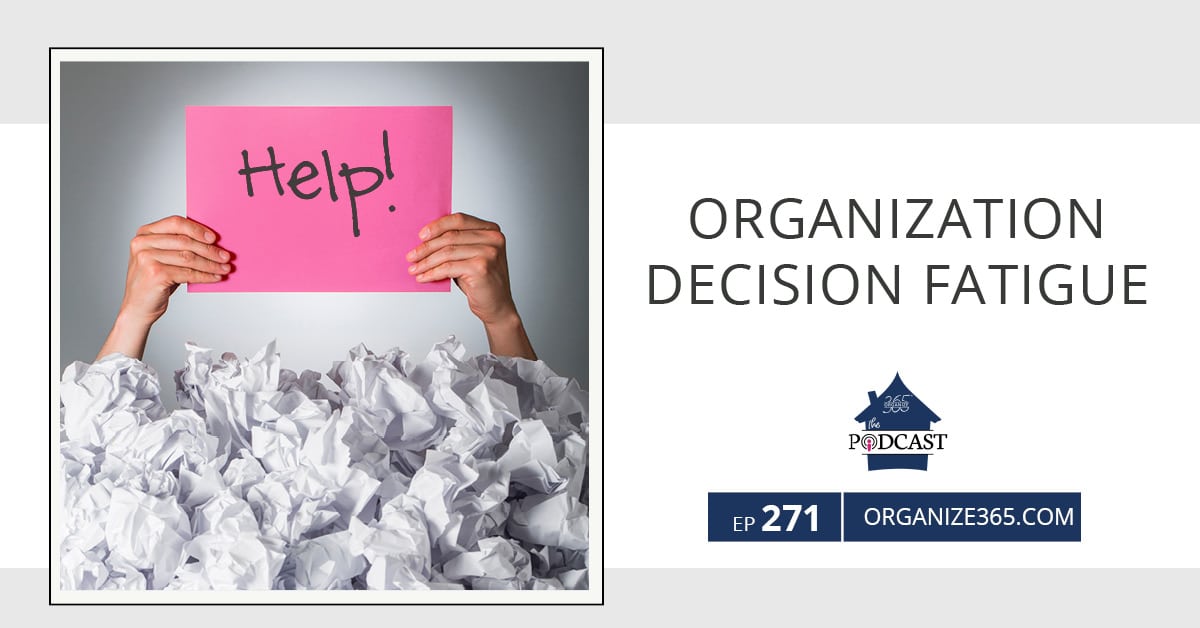
Decision Fatigue
Do you suffer from decision fatigue? When you’re bombarded with too many decisions, your brain works in overdrive. And, you end up mentally and physically exhausted.
So many of you have asked me to talk about this issue on the podcast, so…here it is!
But, before you jump into this episode, it’s worth checking out the Time, Money, Motivation podcast (ep.269). The trifecta I talked about in that episode will help change your mindset.
When you learn to look at things differently, you’ll have the willpower to make real transformational change.
To help you out, we offer a FREE week trial of The Productive Home Solution. It won’t work miracles. But, it will bring you leaps and bounds closer to living a stress-free and more organized life (minus decision fatigue!).
The truth is that you don’t need to run a marathon or get a Ph.D. to experience a transformation. You can achieve a very BIG change from a very tiny shift in your mindset and daily habits….and, I’m going to show you how!
What is Decision Making Fatigue?
When you’re lost in decision fatigue, you usually lack time, money, or motivation (or all three).
When you wake up in the morning and go about your day, you’ll have X amount of decisions to make.
Your decision-making ability only goes so far. If you’re faced with decision after decision, you’ll burn out. That’s what decision fatigue is.
A nasty little thing, isn’t it?
How can you beat decision fatigue?
Want to know how you can kick decision fatigue’s hypothetical butt?
Grab a hammer, lift your little decision-fatigue monster by the scruff of its neck, and…. ah, I’m just messing with you!
To overcome decision-making fatigue, you’ve got to create rules and habits. Habits take up to 100 days to form and cross the barrier from something you do now and then, to something you do ALL the time.
My entire life is an outpouring of habit stacking. You wouldn’t believe the number of habits I’ve accumulated over the years. But, I wouldn’t have it any other way because they’ve helped me live a super productive life. And, supplied me with lots of energy.
However, habits take a long time to cultivate and develop. I’d be lying if I said it’s easy. It’s not. My advice is to start small. Create no more than three habits per year and make them stick.
Next up, you need to have rules. Rules are instantaneous, and they can adapt.
The $50 Decision-Making Challenge
Everyone has a decision-making limit. An infinitive decision-making capability isn’t a thing. You only get a limited amount of decisions each day. You’ve got to decide whether the decisions you’re making every day are worth your time.
Is stopping to decide what shoes to wear to the gym worth sacrificing a decision slot? Probably not.
So, here’s my challenge for you….
When you go through your week, imagine that every decision you make costs $50. Deciding what to eat for lunch? $50. But, if you’ve already got your lunch prepared and you know what you’re having, you can put that $50 back in your pocket.
If you start looking at each decision as having the same worth, you’ll build your organizational muscles as you begin to see which choices are worth it and which ones are not.
Thinking about the where why & what
The reward of the organization is time. When you’re organized, you get to decide how you use your time. The fewer decisions you make, the higher quality decisions you can make.
To beat decision fatigue, you’ve got to consider the where why, and what.
- Where?
Where does an item go when you don’t want it?
Will it go in the trash or to Goodwill?
When thinking about the where decide for each physical item that you no longer want or need in your home.
It could be as simple as picking up an item and asking yourself if you want to keep it. If you do, put it where it needs to go. If you don’t, ask yourself if it’s trash. If it is, it goes in the trashcan. If not, it goes to Goodwill.
The same can be said for shredding. If you’re faced with a stack of paper that needs shredding, you’ve got to decide where and when you’ll shred it. Don’t bombard yourself with questions. Keep it simple.
Will you shred it, or will you hire someone else to do it? When will you shred it?
The goal is to try to make your decision tree as small as possible. You can do this by creating rules that help reduce the number of decisions you need to make before reaching an outcome.
- Why?
Next, think about your ‘why.’ Why are you making all these decisions?
Pick up your nearest item. Mine happens to be a cup. So, if you were me, you’d ask yourself whether you want to keep this cup. If not, decide if it has any value. If it does, it’s good enough for goodwill. If not, (maybe it’s got a chip or crack) then toss it in the trash.
During this thought process, you’ll have an entire conversation in your head about why you will or will not keep the item in your hand. But you’ve got to be ruthless.
Quiet the chatter in your mind, take control of your decisions, and move on!
The Sunday Basket is the physical way of learning how to detach your self-worth from what your brain is going on and on about.
- What?
Decision fatigue is partly about what you’re going to do with the object you don’t want. But, perhaps even more than that, it’s about what you’re going to do about all the thoughts that you have about the object that you don’t want anymore.
Don’t let your brain get in the way. That little inside voice you’ve got chatting your ear off 24/7 needs to be silenced.
Get in the habit of making tactical decisions.
Create rules that you feel good about. If you feel good donating to Goodwill, make that a rule.
The key takeaway I want you to go away with is to make your decision of where to turn off your brain about the why, and then you’ll have more time and focus on the what! That’s how you’re going to overcome decision fatigue.



